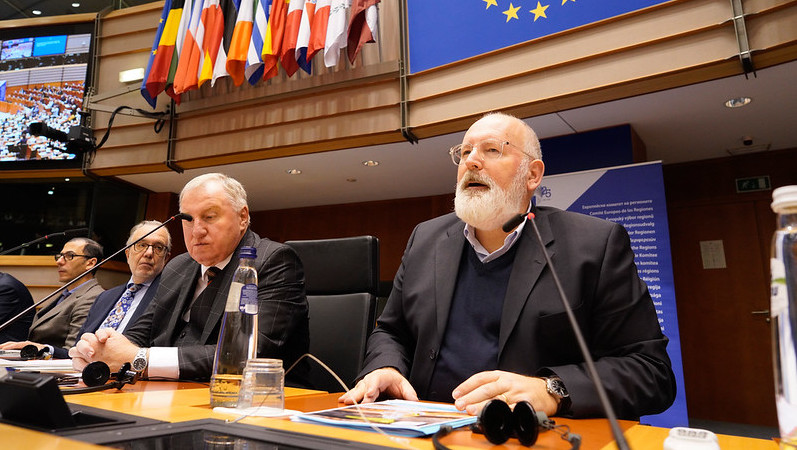The European Commission finally lifted the lid on its long-awaited just transition plans on Tuesday but doubts have already been raised over the amount of funding on offer for the next decade compared to the bloc’s green deal ambitions.
At the first European Parliament Strasbourg plenary session of the year, EU climate chief Frans Timmermans introduced the Just Transition Mechanism as a “pledge of solidarity and fairness” to help Europe go green.
The Dutch commissioner said the proposal was “a message to coal miners, peat farmers and oil shale workers”. EU diplomats previously feared the proposal would end up as a de facto coal phase-out fund.
According to the details of the new proposal, carbon-intensive regions and industries will be able to apply for money, opening the door for producers of steel and even plastics to access funding.
“The prospect of a cleaner future may look good to most but the road to it may look daunting,” Timmermans said, praising the EU Parliament for proposing the idea. He also called on the European Council to make time for it and swiftly adopt a decision on the new overall budget.
Siegfried Muresan, a senior lawmaker from the centre-right European People’s Party (EPP), called on his colleagues to come to an agreement on the Fund in the first half of the year in order to help bolster the talks on the EU’s long-term budget, which are now being helmed by Council president Charles Michel.
The Just Transition Fund (JTF) is the beating heart of the wider mechanism, which aims to mobilise capital worth €100 billion, through grants, private investment and support from the European Investment Bank.
But the fund’s promised €7.5 billion figure has already been criticised for being too low to match the size of the challenge ahead.
German MEP Niklas Nienass likened the overall €100 billion figure to a “slight of hand” and compared the Commission to “street magicians”, while Friends of the Earth Europe said it “is too little to match the scale of transformation needed to confront the planetary emergency”.
Trade union group ETUC Confederal said in a statement “the funding proposed for 10 years is what would be needed every year to achieve climate neutrality by 2050 in a fair way”.
“There is a risk that most of the funds being made available will go to research and innovation rather than directly benefiting affected workers,” said ETUC secretary Ludovic Voet.
In an interview with Euractiv France, socialist MEP Pierre Larrouturou deplored the meagre €7.5 billion proposed in the European Commission’s Just Transition Fund. To finance EU climate action, he suggests some of the ECB’s “easy money” could fuel the European Investment Bank (EIB) instead of going into private banks.
In his speech to Parliament, Timmermans acknowledged that the €100bn was “just a start” but insisted that the fairness of the proposal will inspire the rest of Europe’s green deal.
This is a reminder that CHN is a small independent news site, dedicated to bringing you news from all over the world. That’s expensive and we need our readers to help. Here’s how you can, even for a few dollars a month.
Friends of the Earth added that only countries “doing their fair share of climate action” should be eligible for money and that all fossil fuels should be excluded from the EU budget as a whole.
Gas seems destined to retain a degree of support from the bloc’s coffers but nuclear will not benefit from the JTF. Regional commissioner Elisa Ferreira told Euractiv in an interview that “it will be excluded”.
Executive Vice-President Valdis Dombrovskis outlined the wider €1 trillion-strong Sustainable Europe Investment Plan (SEIP) at the plenary session but explained that there is more to the plan than pots of cash.
The EU’s economy chief cited a recent update to the EIB’s energy lending policy, revenues generated by the Emissions Trading Scheme (ETS) and a newly-brokered sustainable investment taxonomy.
“We will explore how this can be used in the private sphere and public policies,” the Latvian Commissioner said, adding that the EU executive will assist countries in accessing money, although member states have struggled to absorb cohesion funds during the current period.
China-backed coal plants on EU’s doorstep hide huge carbon costs
Five Star Movement MEP Rosa D’Amato, whose hometown of Taranto is one of the areas likely to apply for funding, said ETS revenues could be funnelled directly into the just transition pot. But that is a contentious issue, as money normally flows into national budgets.
Another issue already likely to divide politicians and diplomats concerns eligibility criteria for the fund, with the Commission taking a political decision to open the door to any member state to file applications on a regional basis.
They will have to fulfil certain economic, social and scientific criteria but some political figures, particularly from Central and Eastern Europe, have already said only countries most affected by the issue should be able to submit applications.
Commissioner Ferreira confirmed that rule of law conditionality will apply to the fund, despite previous rumours the plan would relax those particular criteria to please countries like Hungary and Poland.
However, Swedish Greens MEP Pär Holmgren warned that a lack of criteria on dedication to climate policies was sorely missing from the fund’s details. Poland refused to sign up to a far-reaching decarbonisation plan in December, while other member states have been criticised for drafting weak energy strategies for the next decade.
The attention now switches to the Council, where the budget talks will determine whether the Commission gets its way or if criteria and funding resources will be tweaked.
This story was originally published by CHN’s media partner EURACTIV.
